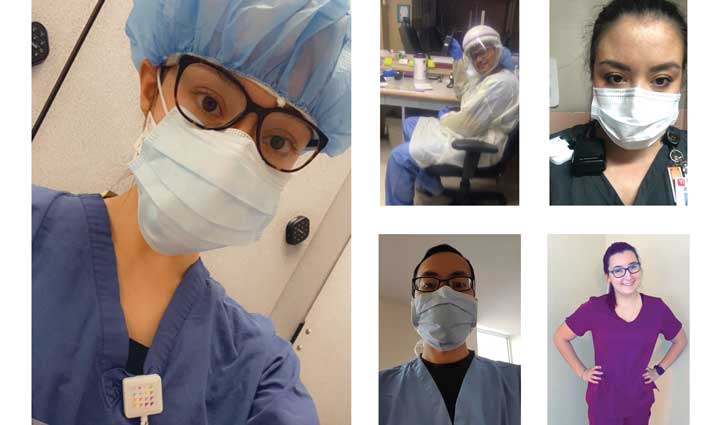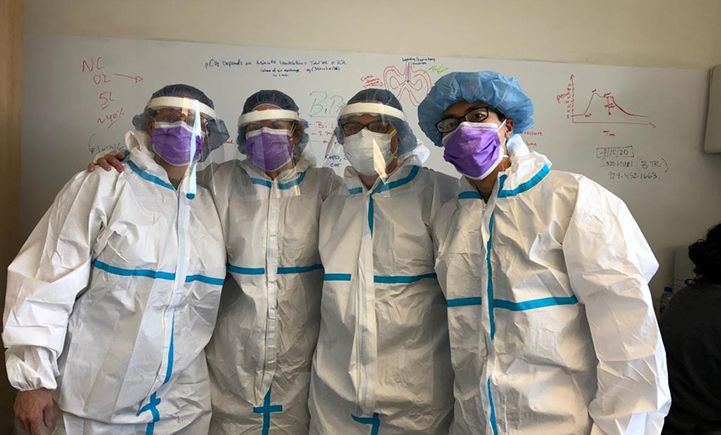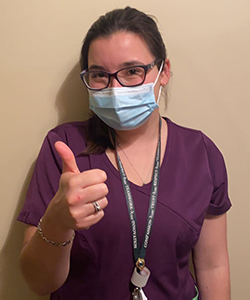Trial by fire: Nursing students on the frontlines
Decker nursing students working in hospitals share their stories

Their mask-clad faces appear on the news every day. They’re nurses working on the frontlines in hospitals and healthcare facilities everywhere. And some of them are just students.
Binghamton University asked nursing students from Decker College of Nursing and Health Sciences about what it’s like to be working in a hospital during this pandemic, how they’re staying safe and if this experience has changed their outlook on nursing.
Here’s what they had to say, in their own words.
Meet the students
Erin Brembs is a student in Decker’s baccalaureate accelerated track (BAT) program and will graduate in May. A little over a month ago she began working for Northwell Health at Southside Hospital on Long Island as a float nurse attendant.
Sagarkumar Patel will graduate from Decker’s family nurse practitioner master’s program in May. He earned a bachelor’s in nursing from Decker in May 2017, the same year he began working as a registered nurse at UHS Wilson Medical Center in Johnson City. For the last three years he has worked in the hospital’s emergency department observation unit.
Allison Roma is a first-year graduate student in both the family nurse practitioner and PhD programs. She also holds bachelor’s degrees in nursing and English from Binghamton. She was furloughed in late April from her job as a nurse resident in the transitional care unit at UHS Binghamton General Hospital, where she had been working since last September.
Joy Saarie will graduate from the baccalaureate accelerated track program in May. She has been a nursing assistant in an oncology/medical-surgical unit at UHS Wilson Medical Center since November 2017.
PhD candidate Tak Yan has worked for the past year as a full-time nurse practitioner at Lincoln Hospital, one of 11 public hospitals in New York City. He is also a part-time soldier and is currently mobilized with the Army Reserve, providing Defense Support of Civil Authorities (DSCA) assistance with coronavirus response.
Q. Have you had contact with patients infected with COVID-19?
Brembs: At my hospital, almost all patients at this point are COVID-19 positive, and if they aren’t, we still assume they may be. I’ve been solely with COVID-19 patients the past four weeks.
Patel: The unit that I regularly work at has been transformed into a COVID unit to handle the influx of COVID-inflicted patients. I have been in contact with multiple positive coronavirus patients throughout this month and a half of lockdown. I have also been working on another unit that works to rule out patients in terms of whether or not they are infected by the coronavirus.
Roma: I have not had direct contact with patients who have been diagnosed with COVID-19; however, I have been in direct contact with patients in COVID isolation due to suspected infection.
Q. How are you protecting yourself at work?
Brembs: When we arrive at work we are required to put on a surgical mask before entering. Before heading to my assigned floor, I’m required to change into a pair of hospital scrubs that I return before I leave for the day. Once on the floor, we don [personal protective equipment (PPE)] to enter each room — N95 mask, gloves, gown, goggles, hair cover, face shield. Since almost all floors are COVID units, we wear our N95 mask the entire day, as well as our goggles/face shield. The only thing we change between rooms is the gown and gloves. For the past four weeks I’ve been using the same N95 mask, but we were just told we will be able to ask for a new mask every day so I’ve been feeling a wave of relief!
Saarie: In my unit we are required to wear a single surgical mask for the entire shift. Like everywhere else, our hospital is experiencing a shortage in supplies and we have to preserve the PPE as much as we can. We are also required to wear our bio-vigil badges (electronic hand hygiene monitors), which are used to reassure that we are using proper hand hygiene every time we go in and out of a patient’s room. Since my unit does not hold any COVID-19 patients, we’re not required to wear N95 masks or be completely gowned up. There is a team of people who have been making face shields for us to wear. Since we have no choice but to wear the same surgical mask in every room, it’s nice to at least have the shields to help protect the integrity of the surgical mask when we’re managing different types of isolation patients.
Yan: Initially, I was wearing the minimum PPE — a surgical mask — but I kept my distance. PPE is now more available compared to earlier in the crisis, so I am wearing the full appropriate PPE — mask, gown and goggles.
Q. Can you share a patient interaction that stands out?
Brembs: My most positive patient interaction was with a younger woman who was anxious because her family is unable to visit and her cell phone had died so she hadn’t been in contact with anyone for a few days. She was feeling isolated, since we need to keep the patient rooms closed and limit the number of times staff go in. I made it a point to round on her more frequently, and on my lunch break I ran to my car and got my charger so she could charge her phone. At the end of the day she was so grateful and she seemed to be in a much better mindset. She told me nobody had attempted to sit and calm her down or help get her connected with her family. She was around my age, so I knew she was probably feeling anxious and sad, and I just thought to myself what my needs would be in that situation.
Patel: One of the most memorable moments that I have experienced from working on the coronavirus unit is holding my patients’ hands and telling them they are going to be OK — because they see this as a death sentence. One of the worst moments I have experienced was when I had to tell a patient that they may not see their significant other once this is all over. That has been one of the hardest things I have had to do.
Saarie: A memory that sticks out in my head while working since the COVID-19 outbreak started is when an immunosuppressed patient said to me that she was scared. It broke my heart to hear her say it the way she did because she was quiet, and I could see the worry on her face. I think the saddest part of all of this is that, aside from the COVID-19 patients, there are still other patients in the hospital who are going through tough and scary times. Due to COVID-19 and the all of the restrictions, she felt scared and alone. Not only does she have to be scared of what she is going through, but she has to be scared of getting infected with the virus. When moments like this happen, it motivates me even more to be strong and confident for the patients. We’re the only support these patients have. I remember holding her hand and telling her that I know that these are especially scary times, but I reassured her that we’re going to take good care of her and do everything we can to protect her.
Yan: I recently interacted with a 24-year-old female with suspected COVID-19 who was breathing fast and working to breathe. I knew she would eventually tire out and go into respiratory failure/arrest. Her oxygen saturation went from high 80s down to 40s-50s, even with noninvasive ventilation support. She yelled out that she couldn’t breathe. I felt helpless, all I could do was watch. She would need to be intubated, and for those being intubated the outcomes are not looking good.
Q. What does being in a critical healthcare role mean to you?
Roma: It means dealing with many issues at a time while staying focused and keeping a clear head so you can provide the best care. There is a lot at stake in critical healthcare roles, so it is important to work in a collaborative and cooperative environment. I am constantly aware of my communication, making sure that I am a good team member and that I communicate clearly to staff and patients, and have all the information I need to do my job. I also ask a ton of questions of my coworkers, who are extremely helpful and knowledgeable.
Saarie: Even before the COVID-19 outbreak, I said to my sister that from what I’ve seen, nurses are real rock stars and I aspired to be one. It’s cliché, but nursing is truly a combination of art and skill, and not everyone is cut out for it. It means so much to me to finally have found a career that I can be so passionate about and proud of. It’s unfortunate that due to the circumstances healthcare workers are finally getting the recognition they deserve. However, no one ever got into this field seeking gratitude. I think we all got into it because we just want to help others.
Yan: All clinical and ancillary staff are critical, depending on their situation/need, but they all play a role.
Q. How are you managing your stress during the pandemic?
Brembs: I never realized how emotionally taxing being a nurse can be. I’m not even a nurse yet and I am 100% feeling it. A lot of nurses cry and vent in the break rooms; they’ve put their lives on hold to show up for their patients. They’re scared, but once they are at work they are strong-willed and get the job done because there is no time to be scared. They are caring for very critical patients, and seeing sad outcomes day in and day out.
Roma: I have managed stress through exercise. I run frequently to release stressful thoughts and I have made myself an at-home full-body workout program that I try to follow. I have also been taking frequent walks. I also manage stress by talking things out with people whose opinions I value. I listen to music frequently.
Saarie: I haven’t been getting great sleep lately. On top of my own personal issues, I think the anxiety of finishing nursing school, needing to pass the [nursing licensure] exam and starting off as a new nurse in the middle of a pandemic that is not likely to go away any time soon is more than intimidating and overwhelming.
Q. Has working in a hospital during the outbreak changed how you feel about nursing?
Brembs: Although I already had a lot of respect and admiration for nurses, this pandemic has shown me how relentless, strong and essential nurses are. To be able to come back day after day and do an amazing job given the circumstances is truly admirable! It makes me very proud that in just a few months I’ll be able to put the same passion and drive into my practice as an RN.
Patel: This pandemic has made me love what I do even more because we’re able to bring a little bit of light into this dark world we are living in — bring a little bit of joy and happiness to people by saving lives every day.
Roma: This experience has made me not take for granted that I will always have the tools I need to help patients while keeping myself safe at the same time.
Saarie: I was already aware of how stressful this line of work can be, but I think all of this has definitely opened my eyes to what the worst-case scenarios can really look like and how there’s potential for things like this to keep happening in the future. I’ve weighed the pros and cons in my head, asking myself: Will risking my life or the lives of my loved ones be worth it? It’s really hard to think about that. However, I keep going back to the thought that someone has to do it, and I believe that I can do it. Our country is already in the midst of a huge nursing shortage. I am proud to (soon) be a part of something so important.
Yan: The pandemic didn’t change how I feel about nursing. I know the good work I do. Nurses are the linchpin of the healthcare system. It’s unfortunate that it takes a disaster to remind the public.



